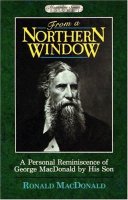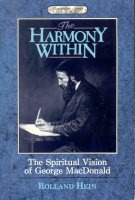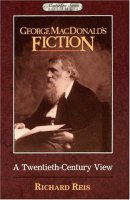


The Masterline Series of studies on George MacDonald, edited by Michael Phillips (Sunrise Books, 1989)
Volume 1: From a Northern Window: A Personal Reminiscence of George MacDonald by His Son by Ronald MacDonald
Volume 2: The Harmony Within: The Spiritual Vision of George MacDonald by Rolland Hein
Volume 3: George MacDonald's Fiction: A Twentieth-Century View by Richard Reis
The first book is an interesting look at George MacDonald through the eyes of one of his sons. It was definitely worth reading, though not sufficiently well-written to encourage me to anticipate reading it again.
The other two are another story; I found them dust-and-ashes. Not dry, as in pedantic or overly academic, but of almost no value to me. And not for obvious reasons.
Both these authors have a good deal of respect for MacDonald and are fulsome in their praise of some of his works, so my active dislike of their books is not because they abuse one of my all-time favorite authors. C. S. Lewis, whose praise of MacDonald is as high as one person can give to another, acknowledges that while some of his works are unsurpassed, many others are clearly mediocre. As far as I can tell his points are valid, so the fact that these authors say the same thing can't be the sole reason I find their works unprofitable. I have to say, though, that some of what the literary world finds of no value I think is great. MacDonald was a preacher, and the fact that his philosophical ideas come through in his books is a plus for me. Not to mention that, unlike the literary world, I like happy endings and characters who are "too good to be true."
Partly, I'm sure, my dislike of these books is because they are in the genre of literary criticism, and the process of pulling apart a book to see what it is made of is distasteful to me. (Michael Ward's Planet Narnia is the only exception that comes to mind.) I've always been a voracious reader and it's obvious how much I now enjoy writing, but I hated English class at every level of school, and the process of taking apart a good (or bad) story, and guessing at what the author "really" meant, was largely responsible for that. I especially resent the apparent need to find "obvious" sexual meanings embedded in otherwise lovely and as far as I can tell innocent stories—which both Hein and Reis do. Possibly MacDonald meant the sexual references—he was a man, and as a gender men do have some extraordinary ideas about sex, plus he had eleven children—but I'm skeptical.
That aside, I did pull out a few quotes I wanted to remember:
These are from Ronald MacDonald's From a Northern Window.
After his abandonment of the predicant profession, he never took remuneration for a spoken sermon; and never, I am sure, refused his preaching, from whatever Christian denomination the invitation might come. I remember very well his saying that the Unitarians were among the most instant to get him to preach; and that he always stipulated for liberty to maintain the doctrine of the Trinity; by which orthodoxy I do not think he ever gained a Sunday's rest. (p. 35)
His own family of eleven children, whatever the narrowness of accommodation or banking-account, seemed never enough to keep the house comfortably full. During his lecturing tour in the United States, in 1872-3, it was widely reported that he was father of thirteen children—a mistake proved to be due to his frequent statement that he had "the wrong side of a dozen." (p. 50)
These from The Harmony Within by Rolland Hein.
MacDonald felt deeply that the great possibility for mankind is to grow into complete godlikeness, so that men shall be one with God. This does not mean that men shall be absorbed into God, as more pantheistic systems hold; rather, as men mature into moral and spiritual perfection, they develop at the same time a more distinct individuality. ... MacDonald's vision is one of an innumerable multitude of redeemed individuals with a final unity of will and spirit. (p. 30)
God made each man unique, MacDonald insists, and God intends that each maintain his uniqueness, that he might serve and worship the Lord in a way no one else can. The result is that each man both learns and teaches something of God in his relations with his neighbors. (p. 68)
And these are from George MacDonald's Fiction by Richard Reis.
More interesting ... are MacDonald's views on God's self-expression in nature. "This world is not merely a thing which God hath made, subjecting it to laws; but it is an expression of the thought, the feeling, the heart of God himself." "Nature is brimful of symbolic and analogical parallels to the goings and comings, the growth and changes of the highest nature in man." "The faces of some flowers lead me back to the heart of God; and, as his child, I hope I feel, in my lowly degree, what he felt when, brooding over them, he said 'They are good'; that is, 'They are what I mean.'" "There is not a form that lives in the world, but is a window cloven through the blank darkness of nothingness, to let us look into the heart, and feeling, and nature of God." (p. 38)
I shall not discus at much length MacDonald's theories about the interpretation of Christ's words in the New Testament, because his views are essentially those of every other interpreter—that Jesus taught precisely what the interpreter believed all along. (p. 37)


